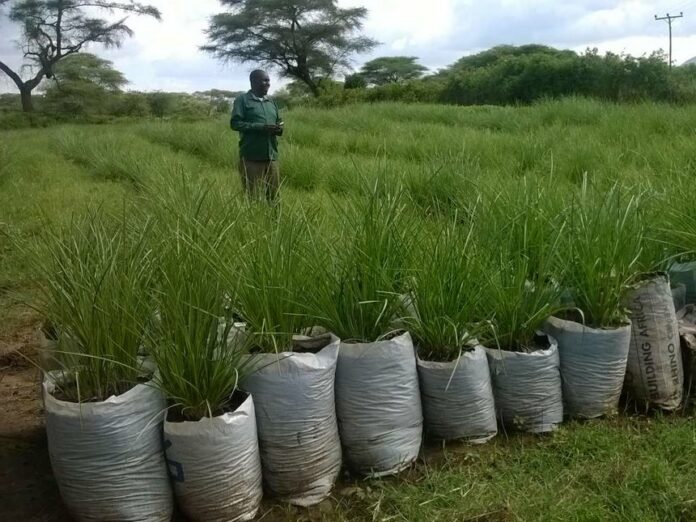One farmer in Elgeyo Marakwet county has ventured into vetiver farming, which is known for its aromatic oil used to make perfume.
Samuel Teimuge was introduced to the crop by one of his friends.
“This is like gold to farmers but few of them have discovered it. Once it takes root, this will revolutionize agriculture,” Teimuge said.
As wheat and maize farmers in the region grapple with many challenges including high costs of input, Teimuge is busy expanding his ‘green gold’ farm.
“I started it as a pilot project in a small area in Ilula area in Uasin Gishu county and it did well. That made me thirsty for more knowledge on the crop,” he said.
Vetiver grass grows up to 150cm high and forms clumps with long stems and long, thin and rigid leaves. Its roots grow downwards and it takes between six months to one year to mature. The plant requires a lot of water to survive.
“One needs to dig the hole well and insert the plant’s slip just like when you are planting a tree seedling. In a few months, it would have multiplied and formed a clump. The plant also exudes aroma which I can tell you will make you not want to leave the farm,” he said.
Teimuge has 50,000 tubes at his Kapsoo farm in Kerio Valley and 10,000 tubes at Ilula in Eldoret.
He plans to plant more for the market with the minimum cost of a slip being Sh50.
With other countries already exporting vetiver oil, Teimuge is now targeting to venture into perfume oil production from the plant.
Countries like China, India and Brazil are well known for vetiver grass farming.
“Their root holds oil and it is through an industrial process that it is extracted. Once the plant is 18-24 months old, the roots have oil. My plants are now 13 months old and soon I am going to do a trial on extracting perfume oil. The challenge is setting up the machinery,” Teimuge said.
He has introduced the crop to 39 other farmers, who have started growing it. They have also formed a group called Konyasoi Vetiver Network.
He says the group will enable their planned perfume oil production project viable.
“We expect the demand for the crop will soon shoot and that is why we have joined hands as farmers in Kerio valley,” he said.
Due to the plant’s roots growing deep and straight into the ground, the crop also prevents soil erosion.
“Last April we agreed as a group to plant more plants since many people have been asking for the plant to prevent soil erosion. I planted the crop on the valley and you can see soil erosion on the site has stopped,” he said.
Vetiver is also used to make animal feeds and thatching houses.
“Once it is three months old, it turns green ready to make animal feed or you can allow your cattle to grace on the farm. Egerton University is at the moment doing research on Vetiver grass to see its nutrient components as compared to other grass,” said Teimuge, adding that one farmer in Kerio valley has started making ropes from the plant which are very strong.
It is also used to make mats, ciondos and any other household products.
Teimuge is currently popularising the crop in the region. “Our farming methods have led to soil leaching and we should plant vetiver to prevent our soil,” he said.











